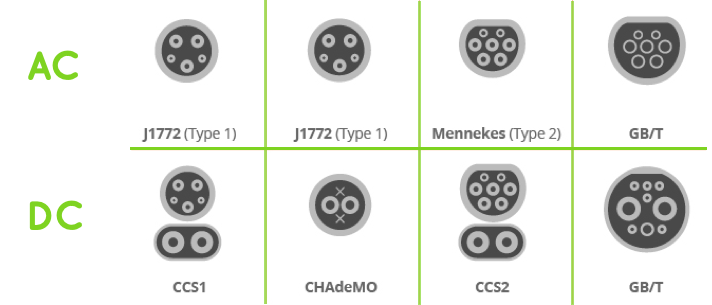EV Charging connector types and Its applications.

There are many reasons to consider switching from a gasoline-powered car, to one that’s powered by electricity. Electric vehicles are quieter, cost less to operate and produce far fewer total emissions well to wheel. However, not all electric cars and plugs are created equal. In particular, the EV charging connector or plug type standard varies across geographies and models. While there is contention around universal plug technology, there is critical mass from global automakers supporting the Combined Charging System (CCS) in North America and Europe, while Japan and its automakers use CHAdeMO, India use bharat plug and CCS (type 2), and China uses GB/T.
SAE J1772

SAE J1772, also known as a J plug, is a North American standard for electrical connectors for electric vehicles maintained by the SAE International and has the formal title "SAE Surface Vehicle Recommended Practice J1772, SAE Electric Vehicle Conductive Charge Coupler".
IEC 62196 / Type 2 / mennekes

The IEC 62196 Type 2 connector (often referred to as mennekes in reference to the company that originated the design) is used for charging electric cars, mainly within Europe, Asia. The connector is circular in shape, with a flattened top edge and originally specified for charging battery electric vehicles at 3–50 kilowatts, with a plug modified by Tesla capable of outputting 150 kilowatts. Electric power is provided as single-phase or three-phase alternating current (AC), or direct current (DC). In January 2013, the IEC 62196 Type 2 connector was selected by the European Commission as official charging plug within the European Union. It has since been adopted as the recommended connector in some countries outside of Europe, including India.
CCS 2 / Combined Charging System

The Combined Charging System (CCS) is a standard for charging electric vehicles, which uses the Combo 1 and Combo 2 connectors to provide power at up to 350 kilowatts. These two connectors are extensions of the IEC 62196 Type 1 and Type 2 connectors, with two additional direct current (DC) contacts to allow high-power DC fast charging.
How do I know which connector my electric vehicle uses?
For level 1 and level 2 charging, all electric cars use the connector that is the standard in their respective markets, India, North America, Europe, Japan etc The sole exception being Tesla, but all of its cars come with an adapter cable to power with the market standard. Non-Tesla electric vehicles can also use Tesla Level 1 or 2 charging stations but they need to use an adapter which can be purchased from a third party vendor.
For DC fast charging, Tesla has a proprietary network of Supercharger stations that only Tesla vehicles can use, no adapter will work on these stations because there’s an authentication process. Tata, Nissan and Mitsubishi cars use the Japanese standard CHAdeMO and Type 2/mennekes, and virtually every other electric vehicle uses the CCS charging standard.
If you are interested in electric car charging at home and are concerned with different EV charging connector types, there’s no need to fret. Every charging unit in your respective market will come with the industry standard connector that your EV uses. In North America that will be the J1772, and in India it’s the Type 2. If you have any questions, please feel free to contact our customer support team, they’ll be happy to answer any electric vehicle charging questions you may have.